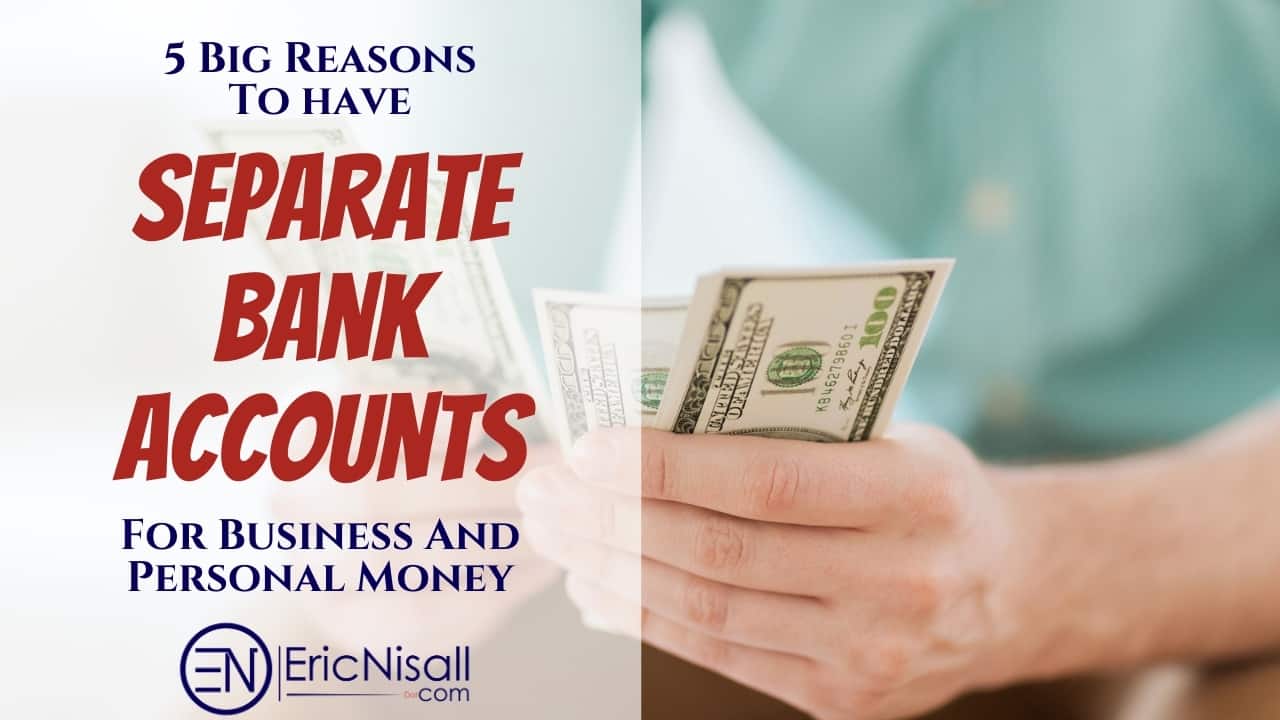5 Big Reasons To Have Separate Bank Accounts For Business And Personal Money
This post may have affiliate links. Please read the Disclosure Policy for complete details.
As a business owner, you have two components to your finances:
- You have business money.
- And you have personal money.
Keep them in separate bank accounts.
That is a fundamental piece of financial advice.
Almost all experts will advise this:
- Lawyers
- Accountants
- Business Coaches
- Financial Planners
It is relatively uncommon for certain things to be almost universally agreed upon, but this happens to be one such instance.
And, it happens to be very sound advice.
How so?

1. Separate Bank Accounts Helps Psychologically
People love to separate their money for different needs and wants.
They open bank accounts for different purposes like vacations and holiday gifts.
They stuff money in envelopes labeled for specific purposes.
Why?
It’s a psychological technique that helps them reach specified financial goals by preventing the robbing of Peter to give to Paul.
It makes sense that by having separate bank accounts–one specifically designated for business purposes–you will use that money solely to operate your business.
It’s the exact same reasoning for having separate pots for personal goals.
Having a clearly defined business pot follows that same logic.
You will be less likely to raid the business to pay for personal expenses, keeping that money where it belongs.
Should you need money to cover personal expenses at some point, you will simply take a draw to pay yourself (whether by writing a check or online transfer).
You have separate bank accounts and transfer the money at regular intervals.
After all, that’s how you’re supposed to take money out of a business.
And, from all of the blog posts on the subject, it would seem that not only do people need to use psychological tactics to manage money, but many also find success in it.
So if psychology works to save for emergencies or specific purchases, what’s the big deal about employing such techniques to keep your business and personal finances independent of each other?

2. Maintaining Separate Bank Accounts IS Easier
There’s enough work that goes into starting a business without making more for yourself unnecessarily.
There are some people who say that there is no need to have separate bank accounts, as having multiple accounts is too difficult to track.
Maybe for an old indie/hippie lady that’s true.
Some will ask if there are more of them, how is it easier to maintain separate bank accounts?
Well, for starters, everything is easier to keep track of.
People who are completely useless at keeping track of their finances have a built-in method of keeping business and personal money accounted for in each respective account.
All of your business transactions will be grouped together.
You won’t have to sift through every single transaction on every statement to pull out specific ones for sorting later.
If you’re the type of person who is clueless about accounting or bookkeeping systems (in which case you really should hire a tax accountant), you’ll at least have some distinction between your personal and business stuff.
If you want to see how your business is performing financially, there aren’t a bunch of non-business items to fudge the figures.
If you want to see how your household’s monthly budget is faring, your business transactions won’t get in the way.
A place for everything and everything in its place, as the saying goes.
Technology makes it even easier to manage separate bank accounts.
Most banks allow for a unified log-in, meaning you can have both your business account and personal accounts accessible without having to remember additional passwords (even though using a password manager makes it easier it’s still nice to only have just one login).
Plus, taking a draw is only a few mouse clicks away and instantaneous as well!

3. You May Save On Accounting Costs
Having separate bank accounts should make it easier for your accountant to deal with your info since they won’t have to separate the data themselves.
That’s assuming you actually have a tax accountant because you know it makes more sense to outsource certain tasks so you can spend your time on revenue-driving activities.
The more work your accountant has to do, the more it will cost you.
It’s a simple equation.
If you’re all up in arms about paying the bank fees, imagine how you’ll feel knowing how much you have to spend just for your accountant to sort through all your personal stuff to find the business transactions.
The same holds true for those of you who employ a freelance bookkeeper to come in and do the bookkeeping for you.
At $25 or more per hour, if you can cut their service by just one hour you can more than recoup the fee for having separate bank accounts.
Who doesn’t like coming out ahead while still getting everything done?
Oh, wait, that’s right, there is still such a thing as free business checking accounts being offered.
Guess that eliminates the talk of fees.
And that means you keep all of the savings in the business by reducing the amount of accounting work you pay others to do!

4. Your Private Spending Will Remain Private
You’re not forced to acquire an EIN for yourself to use in your sole proprietorship or single-member LLC, but it makes sense to do so.
Why?
Because you won’t have to give out your social security number, which gives you an added layer of identity theft protection.
The same goes for having separate bank accounts for your business and personal money.
By having separate bank accounts, you are only giving your accountant access to the business part of your life.
If you have to provide bank statements to a credit card company or get audited by the IRS, you may only have to supply the business info (in most cases).
You don’t have to worry about anyone seeing or judging how you spend your personal money.
Who cares if you like to visit swinger clubs?
Want to cross-dress at home, who cares?
Have a video game habit, pssht!
So what if you order Instacart or other delivery multiple times a week?
After all, it really isn’t any of their business, to begin with.
5. It May Help You With The IRS
Not everyone gets audited…in fact only a fraction of the population does, but anyone can be the subject of an inquiry.
The IRS tends to examine sole proprietors who file Schedule C on their income tax returns more closely.
The reason is simple–there’s no distinction between the business and the individual when it comes to taxes.
It leaves the door open for both honest mistakes and purposeful deceit.
Using a separate business bank account at least gives you a bit of insulation.
By limiting transactions to their respective accounts, you can show due diligence in case of an audit.
Making an effort like this can be the difference between an agent finding you guilty of fraudulently passing off personal expenses as non-deductible business expenses or making an honest mistake in using the wrong account.
Using separate bank accounts also makes life easier for the auditor.
In turn, it makes life easier for you as well.
Rather than having to through a year’s worth of transactions in a single account, the auditor’s job is made easier by limiting the info they have to dig through strictly to business transactions.
This speeds up the audit process.
And who knows, if you make things easy for them they make it easy for you and simply overlook inconsequential mistakes.
Wrapping Up
Look, everyone has to make up their own mind on the subject.
Are you required to have a separate account for a sole proprietorship?
NO.
Does that mean you shouldn’t have separate bank accounts?
Again, NO.
Just because it’s not a requirement, doesn’t make it a bad choice.
After all, I just laid out 5 pretty good reasons to get one.
To make things super-simple, just do this:
Sign up for QuickBooks Online and hook up all of your business accounts. That will keep everything separate so you can do business budgeting and keep your personal expenses out of the way.
If you find it easier to get a regular salary and have the taxes handled that way, you can structure your business to elect S Corporation status, sign up with Gusto and they will handle everything for you once you set up your account.
As a bonus, it will also make tax time easier to prepare for, especially if you do it yourself with online tax programs like TurboTax or TaxSlayer!
Your Turn
What’s your stance on the subject? I know there are people who separate all of their savings goals into different accounts, so those people should definitely not be opposed to having a separate biz checking account! Why do or don’t you set up your business in this way?

Great reasons to separate accounts. This advice is very much important now more than ever, given the volume of small businesses, and how increasingly difficult it is to separate your personal life from your business. Nice one Eric!